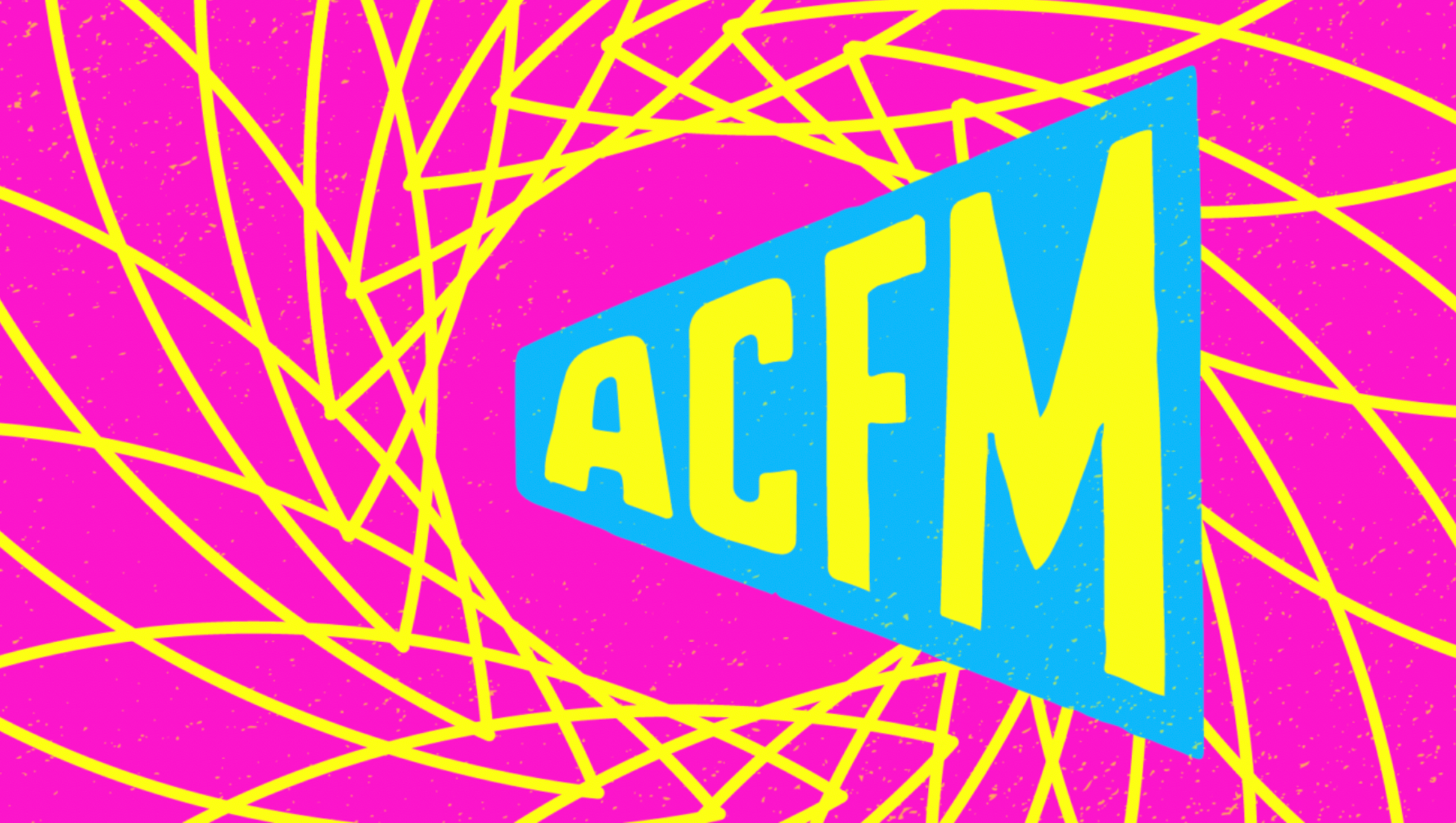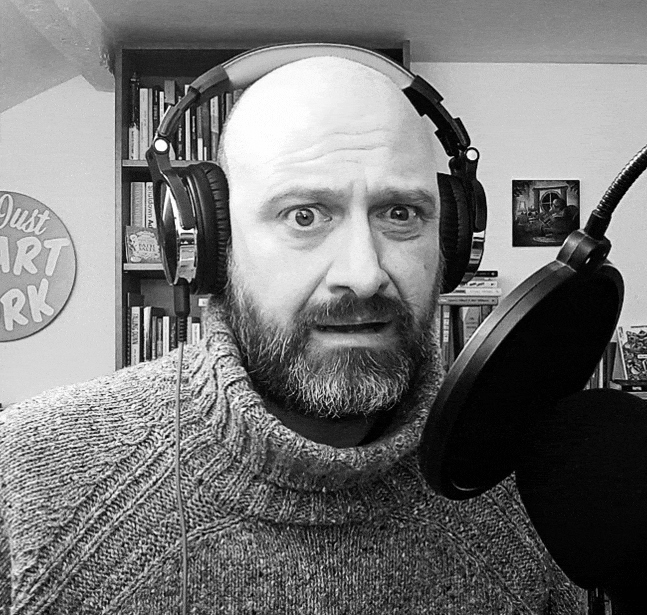MEET THE HOSTS OF OUR TRIPPIEST PODCAST
Why ACFM Is Building a Home for the Weird Left

Every month, Nadia Idle, Jeremy Gilbert and Keir Milburn lead the ACFM community in an investigation into the links between left-wing politics, culture, music and collective joy. Look out for Microdose episodes going deeper down the rabbit hole.
In this behind-the-scenes interview, Chal Ravens, our head of audio, catches up with the gang to find out why they want to build a “weird left” space where politics collides with the anarchic, the trippy and the joyful.

Chal: Who are you?
Jeremy (Jem): Who is anyone? I’m basically an academic and a dad.
Keir: A recent escapee from academia who spends his days designing alternative economic systems and his evenings playing TTRPGs or watching LUFC. Born in Wales but adept at Yorkshiresplaining.
Nadia: A life-long activist, intellectual and dreamer from London and Cairo. I’m a communications strategist, workshop facilitator and lecturer at University of the Arts London.
Chal: Why did you start ACFM?
Jem: We were all involved in the ‘Acid Corbynism’ project that came out of The World Transformed in 2017. Acid Corbynism was this sort of free-floating phrase that deliberately echoed Mark Fisher’s Acid Communism, but was interested in what it might mean to bring utopian and countercultural ideas into contact with mainstream, strategic politics. We chose the title because we wanted to be deliberately vague about whether we were talking about Acid Corbynism or Acid Communism. I think that vagueness is quite productive.
Nadia: We came together as the trippier, more anarcho end of the Corbyn movement who thought that centering joy in our struggle was important to the communication of the vision of what we wanted. We first recorded it in July 2018. I remember Jeremy’s Hawaiian shirt vividly. It was a very hot day. Keir left to go to ‘the shop’ and came back with a massive eyeball. It sat on the table throughout the recording and became our mascot.
Chal: What is the “weird left”?
Nadia: I have no idea. I think we mean the consciousness-raised, joyful, trippy left. We espouse the fundamental belief that while the struggle is real and the project paramount, we’ve got to have a good time TOGETHER, and that’s what makes us human. I reject the Protestant ethic in much of left culture. Also, we don’t take ourselves too seriously, which I think is important.
Jem: The “weird left” is a phrase which I think Keir lifted from a blog or article that was objecting to a certain kind of emphatically normie aesthetic which was being promoted by certain parts of the Anglo-American left at the time: the idea being that in order to appeal to some imagined idea of ‘normality’, leftists should cultivate an image that is essentially culturally conservative.
I’ve always understood the phrase in a fairly tongue-in-cheek way; it’s not that we are really into being subcultural or marginal or avant-garde for the sake of it, and politically I’ve always been critical of people who are into that. But we are interested in many dimensions of experience that, historically, the mainstream left doesn’t have much to say about – from magic to sleep – and we’re interested in what a radical approach to them might be.
Keir: For me, the “weird left” is a left which is attuned to the complexity of life, and which treats the recognition of that complexity as key to adding potency to our lives and social movements. The thing we’re fighting, capital, is itself a very strange entity. Capitalist social relations are premised on the idea that capital will live forever and expand infinitely. But when we align ourselves with this premise we obscure the finitude of our own lives. In The Communist Manifesto, Marx uses the metaphor of a “sorcerer who is no longer able to control the powers of the nether world whom he has called up by his spells.”
Yet while capital might be a weird system, its impact on our lives tends to be anti-weird, reducing our ability to explore the complex possibilities of life. The more that capital is in the saddle, the more our lives are reduced to work and repetitious consumption. The more that the working class is in the saddle, the more time and space we have for exploring what we actually want to do with our lives. It’s this expansion of freedom which is, or should be, the key motivation for the left.
The problem is that in a deeply unequal world any expansion of freedom tends to be unevenly spread – socially, geographically, but also temporally. Working-class power has ebbed and flowed over the last 200 years. In the counterculture of the 1970s, people experimented with new ways of living, expecting that others would too as working-class power expanded. With the reactionary neoliberal turn of the 1980s, those experimenting with complexifying life became cut off from the possibilities of universal transformation. Those who are introducing new forms of life are always at risk of getting cast as weirdos, but during moments of reaction such accusations can harden into real resentment, while weirdness itself can move in reactionary directions.
TL;DR: The “weird left” is one that foregrounds the expansion of freedom while being attentive to the strategic considerations required to ensure that freedom becomes universal.
Chal: What are your favourite episodes so far?
Jem: This is very hard – I don’t have favourites really.
Nadia: Cliché, but I loved our Collective Joy episode during the heady days of election fever. All of them really, I just love doing them. I suppose the ones where we take the piss and laugh out loud are my favourites.
Keir: ACFM tries to explore topics which go beyond those most leftist podcasts would touch. As such, I enjoyed the recent-ish episodes on Horror, Magic, and Games. I’m also fond of earlier episodes on Love and Hate and Intoxication and Sobriety – I think those were the episodes where we really started hitting our stride.
Chal: There’s an ever expanding Spotify playlist of the music you discuss in the shows. Why do you talk about music?
Nadia: Because politics is downstream from culture.
Jem: Music is a big part of what I do as both an academic and as a practitioner. I co-organise and DJ at a regular dance night called Beauty & the Beat, which was part of the inspiration for the original Acid Corbynism idea. Both of our producers are musicians or work in music and it seems a pretty obvious thing to do with an aural medium like podcasting. Obviously there is a strong connection between music culture and the kind of countercultural ideas that we explore on the show.
Chal: Which thinkers are the guiding lights of ACFM?
Jem: The philosophical perspective that we most often come back to is one based on a sort of synthesis of Spinoza and Marx, which you might find developed in the work of more recent thinkers like Deleuze & Guattari and Hardt & Negri (in fact, I will be hosting a monthly online seminar series exploring this tradition with Andrew Goffey and Jason Read later this year), as well as feminist thinkers like Rosi Braidotti. Others who have definitely shaped our thinking would be: de Beauvoir, Fanon, Gramsci, Laclau & Mouffe, Bakhtin, Bataille, Barbara Ehrenreich and Lynne Segal.
Keir: I sometimes think the theoretical core of the show to be a collision between Deleuze & Guatarri (probably the most acid communist thinkers of all) and Gramsci with the latter providing the strategic element which we considered the key distinction between Acid Communism as Mark Fisher described it and the Acid Corbynism which oriented the show early on.
Nadia: I try to be as open as possible to ideas. I’m going to put Simone de Beauvoir, David Harvey and Frantz Fanon into the mix. Ece Temelkuran’s work has got into my bones – I needed to hear those words from a fellow female, secular, Mediterranean Marxist. I was hugely influenced by Mark Fisher and some of my contemporaries when we were organising together in the mid 2010s. I’d love to give you a list of about 50 key thinkers who have influenced me, including lots of Arab thinkers and writers, but the microdose I’m on won’t let me (must be something about the oneness of human thought).
Chal: What’s the future of ACFM?
Keir: Among the topics I want to explore soon are class, Surrealism, cool and death.
Jem: We’d really like to organise more live events and to produce a series of short videos explaining some of our key concepts, but this all depends on how much free time we have.
Nadia: There is absolutely no chance that Jeremy, Keir or I will run out of things to say in the next few decades. We absolutely love doing this. We’d love to run a nationwide reading group. I’d love to have a big event in November this year to mark the FIVE YEARS OMG of this podcast. I’d love us to have a massive fuck-off rave. I have a fantasy of an ACFM tent with me DJing the 2am set playing UK garage and ‘90s bangers. If anyone wants to FUND any of these things, please let us know!
Chal: Anything you want me to pass on to our supporters?
Jem: It’s very important to us that we’re part of Novara Media. It’s one of the few really successful attempts to create a radical and independent media platform in the UK in recent years.
Obviously that couldn’t go anywhere without the supporters, who make it all possible. We always want to thank you very profusely!